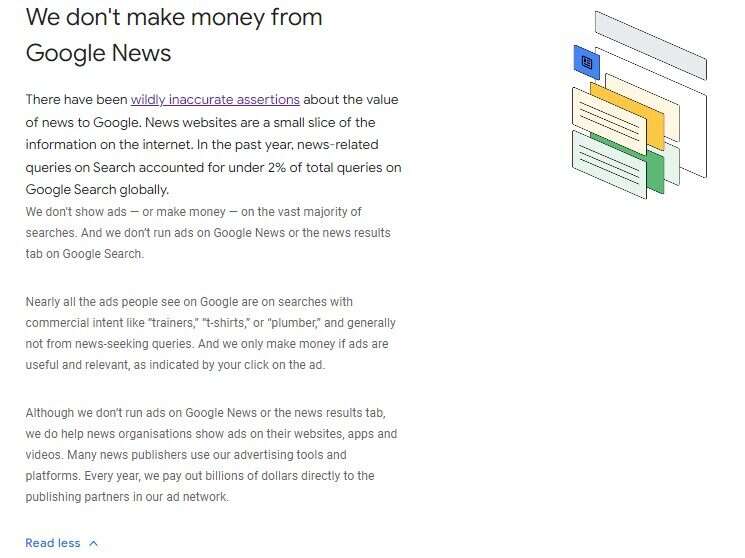
The UK Government on Tuesday formally introduced laws intended to force technology giants to pay news publishers for their content.
The Digital Markets, Competition and Consumers Bill is a wide-ranging piece of legislation that will aim to boost competition in digital markets and provide new online protections for consumers.
For the UK news industry, the bill offers the prospect of Australia-style rules to force Google and Facebook, the duopoly of the digital advertising market, to pay them for their content.
Similar legislation has already passed in Australia – and proved lucrative for many news outlets – and is promised in Canada. The Journalism Competition and Preservation Act has also been making progress in the United States.
As first reported by Press Gazette last month, there is now growing evidence that technology companies are increasing their lobbying efforts in London.
Google has been the sponsor of Politico’s flagship UK newsletter, Playbook, over the past two days. Its message: “Google connects millions of people to UK publishers, big and small — from broadsheets to freesheets, village papers, daily red tops, and more. All part of our commitment to supporting a strong and varied news industry.”
The newsletter links through to a Google page on which the tech giant explains how it “supports journalism and the news industry in the UK” and challenges “wildly inaccurate assertions” about the value of news on its platform.
Earlier this month, Facebook owner Meta published a report claiming that news content plays a “small and diminishing role” on its platform.
Meanwhile, the Institute of Economic Affairs, a free market think tank that counts large businesses among its donors, is lobbying against the Australia-style rules in the UK. It published a report in February cautioning against Australia’s approach.
How the UK law will work
Under the UK’s law, the Digital Markets Unit (DMU), a division of the Competition and Markets Authority (CMA), will designate “strategic market status” (SMS) on a small number of large technology firms.
Once a tech firm has been assigned SMS in a certain sector, the DMU sets a code of conduct for the company that will establish “clear expectations” for how it should treat consumers and other businesses, which could include payments.
For example, the DMU could assign Google SMS in search and write up a code of conduct directing that Google should pay publishers for news that appears on its platform.
If the DMU suspects, or is told via a complaint, that a tech company is not complying with its rules, it can launch an investigation. If the tech company is found to be in breach of the rules, the DMU can issue an enforcement order or fine.
Where the DMU feels it is not appropriate to set prices for payment between a technology company and another company, it will rely on a final offer mechanism to decide how much money should change hands. Under this arrangement, the two sides each put forward a price and the DMU decides which offer is fairer. A key component of Australia’s News Media Bargaining Code, this mechanism is known as baseball-style arbitration.
DMCC welcomed by news industry
Owen Meredith, chief executive of the News Media Association, welcomed publication of the Digital Markets, Competition and Consumers Bill, which he described as a “hugely welcome step forward towards creating a fairer digital economy, delivering real benefit for consumers during a very challenging period.
“As part of this, the legislation will grant the Digital Markets Unit the teeth it needs to level the playing field between news publishers and the tech platforms, paving the way for a truly sustainable future for local, regional, and national journalism in every corner of the UK. The NMA will consider the detail of the bill carefully.
“We hope the bill makes rapid progress through Parliament, with cross party support, so these important measures reach the statute book quickly and can start delivering benefits as soon as possible for consumers and businesses up and down the country.”
However, Meredith cautioned that, while the bill was right to target “unscrupulous operators deceiving consumers with malicious subscription traps”, the government should be careful not to place “undue” burdens of publishers seeking to sell news subscriptions.
Verity Egerton-Doyle, the co-head of Linklaters’ UK technology team, said that when these laws were first proposed in 2020, the “UK looked set to become the global leader” in this field of tech regulation. But now, she added, it has fallen behind other jurisdictions, including the European Union, where the Digital Markets Act is a major focus for tech firms.
In the UK, she said, “even if the DMCC is a top legislative priority, it is very difficult to see how it could come into force before H2 2024, with rules unlikely to start actually applying until early 2025 after the nine month designation process”.
She added that the DMCC would present a “new challenge” for tech businesses because of its “firm-specific codes of conduct based on a set of principles around fair trading, open choices and trust and transparency”.
Email pged@pressgazette.co.uk to point out mistakes, provide story tips or send in a letter for publication on our "Letters Page" blog
